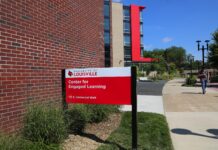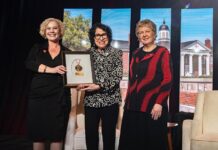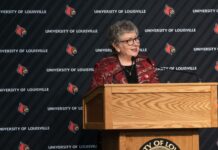The UofL Board of Trustees and the Council on Postsecondary Education approved a plan to build a $38 million, 128,000-square-foot student recreation center (SRC) off Fourth Street between Kurz and Minardi halls. Scheduled to open in fall 2013, the facility will offer:
- increased exercise and weight equipment
- a gymnasium with six courts for basketball, volleyball and other sports
- multi-activity court for indoor soccer, floor hockey and other sports
- aerobics/wellness studios
- a jogging track
- racquetball courts
- a fitness lab
- classrooms/meeting rooms
- locker rooms
- food service and lobby area
- and a gaming area.
The facility also will include a lighted, outdoor artificial-turf field behind Kurz Hall. That field will be used primarily for informal student recreational use, sports club practices and physical education classes. The artificial turf will allow for outdoor activity even during periods of inclement weather.
The center, which will be the first UofL building to be heated and cooled with geothermal energy, is expected to earn gold certification through the Leadership in Energy and Environmental Design (LEED) program.
The SRC will fulfill a promise by the Student Government Association to UofL students. The university first proposed building the facility as part of its master plan in 2009. SGA featured it as a top priority in the SGA 2020 Plan, the organization’s strategic plan, in 2010. Students overwhelmingly supported it – almost 89 percent voted in favor of the SGA plan.
“While UofL provides many athletic and recreational centers for students, SGA realized the need for an updated, state-of-the-art facility that would better satisfy the needs of our entire student body,” said Kurtis Frizzell, SGA president. “Our students will have access to one of the newest and most advanced recreational facilities in the nation. This facility is better, larger and more state-of-the-art than any such facility UofL students currently have access to.”
UofL is seeking private donations to help fund the building. In addition, beginning in the fall 2011 semester, a $98 per semester recreation fee will be applied to all new students (including graduate, professional and readmitted students) and pro-rated, per credit hour, for less than full-time students.
“This facility will address several important issues,” said Michael Mardis, dean of students. “First, it will address the severe shortage of recreational space on our campus. Many of our students join fitness clubs – at a cost of hundreds of dollars – to avoid the overcrowding at our current facilities. We’ve heard their frustration about dealing with the overcrowding concerns.
“Second, as enrollment and the quality of our engaged students has increased, involvement in recreational sports has continued to flourish,” he said. “Thousands of students are participating in intramural sports. The sports club program has grown from eight to 22 active clubs, and enrollment in our group fitness classes has grown by more than 100 percent over the past three years. The new facility will provide students with more space for activities and events.
“Finally, it will provide a dynamic and vibrant place for students to gather and socialize near their residence halls. We have created a student neighborhood, with more than 2,000 new beds added in the past few years on the west side of campus, giving us a total of 5,100 beds. The SRC will further enhance their student experience.”
Student input has been vital to the development of the project. SGA began discussing the facility in August 2009 and worked throughout the next year with the Resident Student Association, the Student Senate (which includes representatives of each college) and other organizations to build support for the SRC. SGA also hosted several student forums to share information, and the student newspaper, The Louisville Cardinal, ran several articles about the facility.
“The Student Government Association has made sure that the student body was involved and represented in every step taken towards getting this recreational center,” Frizzell said. “In every decision made, the student’s voice was right there alongside.”
SGA also worked to ensure that students will benefit from the new facility. The intramural participation fees currently charged to teams will be waived, as will fees for fitness classes. Also, the facility will be open 108 hours per week, up 20 hours from the current availability.
Faculty and staff also will have access to the facility for a fee; details are yet to be worked out.



























